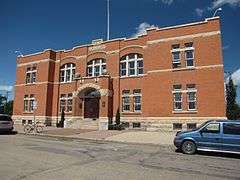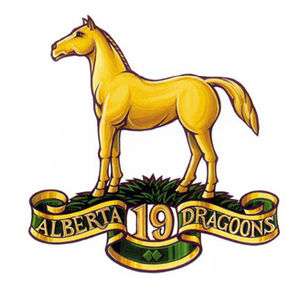19th Alberta Dragoons
| 19th Alberta Dragoons | |
|---|---|
|
The cap badge of the 19th Alberta Dragoons | |
| Active | 1908–1965 |
| Country | Canada |
| Branch | Primary Reserve (Militia) |
| Part of | Royal Canadian Armoured Corps |
| Garrison/HQ | Edmonton, Alberta |
| Motto(s) | None |
| March | "Lili Marlene" |
The 19th Alberta Dragoons originated in Edmonton, Alberta on 1 February 1908, when the 19th The Alberta Mounted Rifles were authorized to be formed and was redesignated as the 19th Alberta Dragoons on 3 January 1911. On 16 February 1936, it was amalgamated with The Alberta Mounted Rifles. It was redesignated the 19th (Reserve) Alberta Dragoons on 7 November 1940. On 1 April 1946, it was amalgamated with the 2nd (Reserve) Battalion, The Edmonton Fusiliers and redesignated as the 19th (Alberta) Armoured Car Regiment, RCAC. It was redesignated the 19th Alberta Armoured Car Regiment on 4 February 1949, the 19th Alberta Dragoons (19th Armoured Car Regiment) on 1 November 1954 and the 19th Alberta Dragoons on 19 May 1958. It was reduced to nil strength and transferred to the Supplementary Order of Battle on 28 February 1965.[1]
In 2006, the 19th Alberta Dragoons were amalgamated with the South Alberta Light Horse, which retained that designation.
The regiment perpetuated the 3rd Regiment, Canadian Mounted Rifles, Canadian Expeditionary Force; the 9th Battalion, CEF; 66th Battalion (Edmonton Guards), CEF; 138th (Edmonton, Alberta) Battalion, CEF; and 202nd (Sportsman's) Battalion, CEF.[2]
William Antrobus Griesbach joined the 19th Alberta Dragoons in World War I.
The Great War
Details of the 19th Alberta Dragoons, the 21st Alberta Hussars and 23rd Alberta Rangers were placed on active service on 6 August 1914 for local protective duty. The 19th Alberta Dragoons recruited the 1st Divisional Cavalry Squadron, CEF, authorized on 10 August 1914, which embarked for Great Britain on 1 October 1914. The squadron was redesignated as A Squadron, Canadian Corps Cavalry Regiment, CEF, on 12 February 1916 and as A Squadron, Canadian Light Horse, CEF, on 21 February 1917. It fought in France from 12 February 1915 until the end of the war and was disbanded on 6 November 1920.[3]
.jpg)
The 3rd Regiment, Canadian Mounted Rifles, CEF, was authorized on 7 November 1914, embarked for England on 12 June 1915 and fought in France as from 22 September 1915 as part of the 1st Canadian Mounted Rifles Brigade until its personnel were absorbed by the 1st Battalion and 2nd Battlion, Canadian Mounted Rifles on 31 December 1915. The regiment was subsequently disbanded on 12 August 1917.[4]
The 9th Battalion, CEF, was authorized on 10 August 1914 and embarked for Britain on 1 October 1914, where tt was redesignated as the 9th Reserve Infantry Battalion, CEF, on 29 April 1915, to provide reinforcements for the Canadian Corps. The battalion was formally disbanded on 15 September 1917. The 66th Battalion (Edmonton Guards), CEF, was authorized on 20 April 1915 and embarked for Britain on 28 April 1916 where its personnel were absorbed by the 9th Reserve Battalion, CEF on 7 July 1916 to provide reinforcements for the Canadian Corps. The battalion was formally disbanded on 30 August 1920. The 138th Battalion (Edmonton, Alberta), CEF, was authorized on 22 December 1915 and embarked for Britain on 22 August 1916 where its personnel were absorbed by the 128th Battalion, CEF, on 8 December 1916 to provide reinforcements for the Canadian Corps. The battalion was disbanded on 30 August 1920. The 202nd Battalion (Sportsmans), CEF, was authorized on 15 July 1916 and embarked for Britain on 23 November 1916 where its personnel were absorbed by the 9th Reserve Battalion, CEF, on 27 May 1917 to provide reinforcements for the Canadian Corps. The battalion was disbanded on 18 February 1918.[5]
The Second World War
Details of The Edmonton Fusiliers were called out on service on 26 August 1939 and then placed on active service on 1 September 1939 for local protection duties. These details were disbanded on 31 December 1940. The regiment mobilized the 1st Battalion, The Edmonton Fusiliers, CASF, on 24 May 1940. It served in Canada in a home defence role as part of the 13th Infantry Brigade, 6th Canadian Infantry Division. The 1st Battalion disbanded on 14 November 1945. The regiment also mobilized the 3rd Battalion, The Edmonton Fusiliers, CASF, for active service on 12 May 1942, which served in Canada in a home defence role as part of the 16th Infantry Brigade, 8th Canadian Infantry Division. The 3rd Battalion disbanded on 15 August 1943.[6]
Battle Honours
- The Great War: YPRES 1915, Gravenstafel, Festubert 1915, Mount Sorrel, SOMME 1916, Flers-Courcelette, Ancre Heights, YPRES 17, ARRAS 1917 1918, Vimy 1917, HILL 70, AMIENS, Scarpe 1918, Drocourt-Queant, HINDENBURG LINE, Canal du Nord, Cambrai 1918, PURSUIT TO MONS, FRANCE AND FLANDERS 1915–18[7]
Armoury
| Site | Date(s) | Designated | Location | Description | Image |
|---|---|---|---|---|---|
| Connaught Armoury 85th Avenue | 1911 | Canada's Register of Historic Places | Edmonton, Alberta Canada |
|
 |
See also
References
- ↑ Canadian Forces Publication A-DH-267-003 Insignia and Lineages of the Canadian Forces. Volume 3: Combat Arms Regiments.
- ↑ Canadian Forces Publication A-DH-267-003 Insignia and Lineages of the Canadian Forces. Volume 3: Combat Arms Regiments.
- ↑ Canadian Forces Publication A-DH-267-003 Insignia and Lineages of the Canadian Forces. Volume 3: Combat Arms Regiments.
- ↑ Canadian Forces Publication A-DH-267-003 Insignia and Lineages of the Canadian Forces. Volume 3: Combat Arms Regiments.
- ↑ Canadian Forces Publication A-DH-267-003 Insignia and Lineages of the Canadian Forces. Volume 3: Combat Arms Regiments.
- ↑ Canadian Forces Publication A-DH-267-003 Insignia and Lineages of the Canadian Forces. Volume 3: Combat Arms Regiments.
- ↑ http://www.cmp-cpm.forces.gc.ca/dhh-dhp/his/ol-lo/vol-tom-3/par1/arm-bli/19AD-eng.asp
Canadian Forces Publication A-DH-267-003 Insignia and Lineages of the Canadian Forces. Volume 3: Combat Arms Regiments
External links
- Canadian Forces Directorate of History and Heritage
- Canadian Expeditionary Force Study Group
- The 19th Alberta Dragoons History Homepage
| Wikimedia Commons has media related to 19th Alberta Dragoons. |
